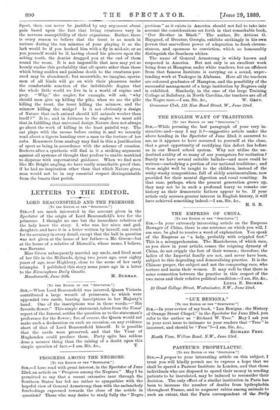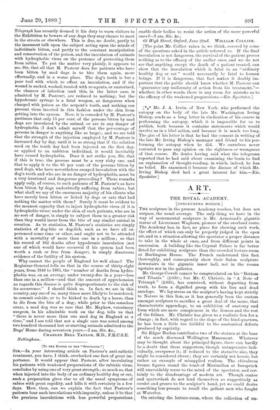PASTEUR'S PROPHYLACTIC.
[TO THE EDITOR OF THE "SPECTATOR."] SIR,—A propos to your interesting article on this subject, trust you will kindly permit me to express a hope that we shall be spared a Pasteur Institute in London, and that those individuals who are disposed to spend their money in sending patients to be inoculated, may be induced to reconsider their decision. The only effect of a similar institution in Paris has been to increase the number of deaths from hydrophobia. throughout France, and to augment rabies among animals to such an extent, that the Paris correspondent of the Daily
Telegraph has recently deemed it his duty to warn visitors to the Exhibition to beware of any dogs they may chance to meet in the streets or elsewhere. This is due, no doubt, partly to the incessant talk upon the subject acting upon the minds of individuals bitten, and partly to the constant manipulation and conservation of the poison, and the inoculation of animals with hydrophobic virus on the pretence of protecting them from rabies. To put the matter very plainly, it appears to me, Sir, that all that M. Pasteur does for patients who have been bitten by mad dogs is to bite them again, more effectually, and in a worse place. The dog's tooth is but a poor tool with which to effect an inoculation, and if the wound is sucked, washed, treated with re-agents, or cauterised, the chances of infection (and this, in the latter case, is admitted by M. Pasteur), are reduced to nothing; but the hypodermic syringe is a fatal weapon, as dangerous when -charged with poison as the serpent's tooth, and nothing can prevent virus inserted in this fashion under the skin from getting into the system. Now, it is conceded by M. Pasteur's partisans that only 15 per cent. of the persons bitten by mad dogs are inoculated by the animal, or are in any danger of hydrophobia (I don't admit myself that the per-tentage of persons in danger is anything like so large) ; and we are told that the strength of the injection employed by M. Pasteur is increased day by day, until it is so strong that if the solution used on the tenth day had been injected on the first day, or applied to an unbitten individual, it would inevitably have caused hydrophobia. Does it not strike you, Sir, that if this is true, the process must be a very risky one, and that to apply it to the 85 per cent. of the persons bitten by mad dogs, who have nevertheless escaped inoculation with the dog's tooth and who are in no danger of hydrophobia, must be a very irrational and dangerous proceeding P These remarks apply only, of course, to such patients of M. Pasteur's as have been bitten by dogs undoubtedly suffering from rabies ; bat what shall we say of the enormous majority of his clients who have merely been bitten or licked by dogs or cats that had nothing the matter with them P Surely it must be evident to the meanest capacity that to inject hydrophobic virus (if it is hydrophobic virus) under the skin of such patients, who are in Ito sort of danger, is simply to subject them to a greater risk than they would incur from the bite of any similar animal in creation. As to statistics, M. Pasteur's statistics are simply statistics of dog-bite or dog-lick, such as we have all ex- perienced some time or other, and ought not to be attended with a mortality of more than one in a million ; so that his record of 162 deaths after hypodermic inoculation (not one of which would have occurred if his system had been worth a rush or free from danger), is simply disastrous evidence of the futility of his system.
Why cannot the people of England let well alone P The Registrar-General tells us that in the course of thirty-eight years, from 1848 to 1885, the " number of deaths from hydro- phobia was, on an average, under twenty-five in a year—less than one in a million—and that the amount of apprehension as regards this disease is quite disproportionate to the risk of its occurrence." I should think so. In fact, we are in this country, any one of us, many times more likely to be murdered, to commit suicide, or to be kicked to death by a horse, than to die from the bite of a dog ; while prior to this senseless craze, a mad dog was so rare that Mr. Mayhew, veterinary surgeon, in his admirable work on the dog, tells us that there is never more than one mad dog in England at a -time," and I am told that not a single case was noted among two hundred thousand lost or starving animals admitted to the Dogs' Home during seventeen years.—I am, Sir, &c.,



































 Previous page
Previous page